Gleaming with grace and German heritage, the German Pinscher stands as a steadfast symbol of strength and loyalty. But what lies beneath their sleek coats and piercing gaze? What are the characteristics that make them truly unique?
From their origins in Germany to their distinctive appearance and temperaments, the German Pinscher holds a wealth of information waiting to be discovered.
So, join us as we uncover the fascinating traits and qualities that define this remarkable breed.
Key Takeaways
- The German Pinscher is an intelligent and loyal breed that makes a good watchdog and protective family companion.
- They have a muscular build and a short, smooth coat in black, red, or blue with red accents.
- German Pinschers are generally healthy but can be prone to hip dysplasia, elbow dysplasia, and eye problems.
- When choosing a dog for apartment living, factors such as adaptability, barking tendencies, and behavior towards neighbors should be considered.
Origin and History
The German Pinscher breed has a rich history, originating in Germany in the 1600s as a descendant of the Old German Pinscher. These dogs were originally bred for various tasks, including guarding property, exterminating vermin, and even herding livestock.
They were highly valued for their agility, intelligence, and versatility. Over the years, the breed's popularity grew, and they became known for their loyal and protective nature. Despite facing near extinction during World War II, dedicated breeders worked to revive the German Pinscher, and today, they're recognized for their elegant appearance and muscular build.
They excel in various dog sports and activities, making them a favorite among active individuals and families. The German Pinscher's history is a testament to their resilience and adaptability.
Size and Appearance
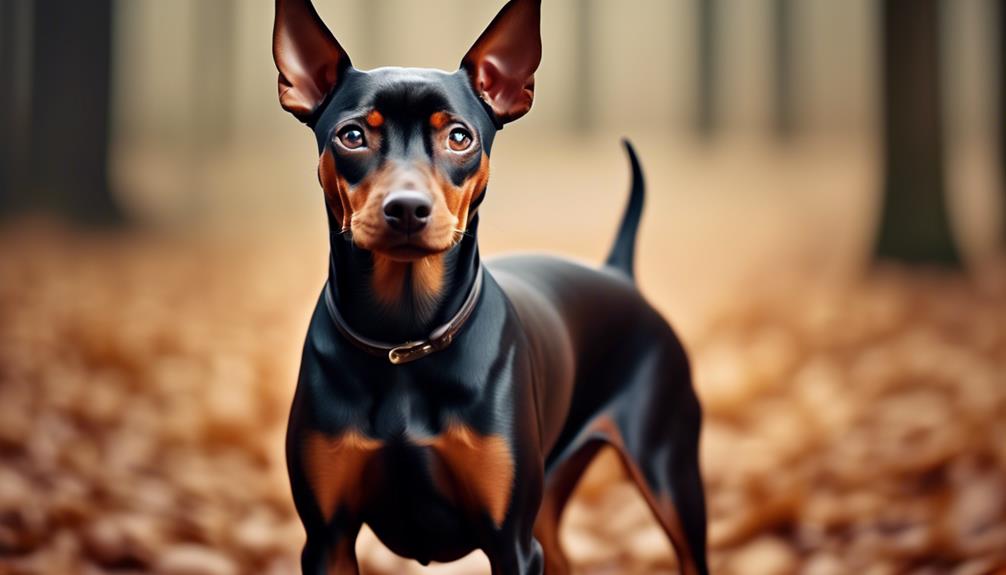
With a muscular build and an elegant appearance, the German Pinscher is a medium-sized dog known for its power and beauty. They typically stand 17 to 20 inches tall at the shoulder and weigh between 25 to 45 pounds. This breed has a short, smooth coat that comes in black, red, or blue with red accents.
The German Pinscher has a wedge-shaped head, dark eyes, and erect ears, giving them a distinctive look. Their athletic body is well-proportioned, showcasing their strength and agility. Overall, the German Pinscher's size and appearance make them a striking and eye-catching breed.
Temperament and Personality
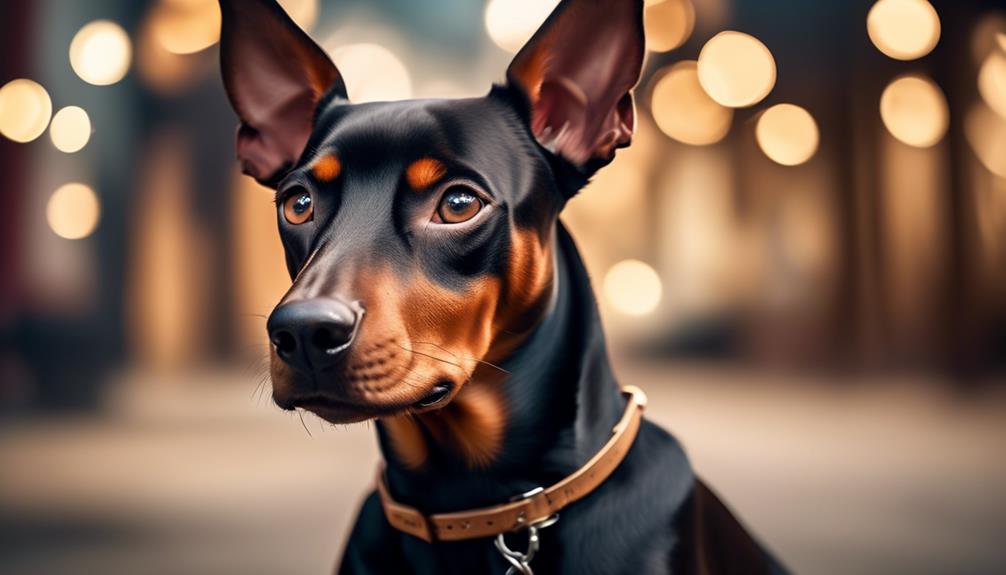
Known for their intelligence, alertness, and loyalty, German Pinschers have a temperament that makes them excellent companions and protective watchdogs. Here are some key characteristics of their temperament and personality:
- Intelligent: German Pinschers are smart dogs that are quick to learn and easily trainable.
- Alert: They have a keen sense of awareness and are always vigilant, making them excellent watchdogs.
- Loyal: German Pinschers are deeply devoted to their families and will go to great lengths to protect them.
- Confident: They possess a strong sense of self-assurance and aren't easily intimidated.
- Playful: Despite their serious demeanor, German Pinschers also have a playful side and enjoy engaging in activities with their owners.
Health and Lifespan
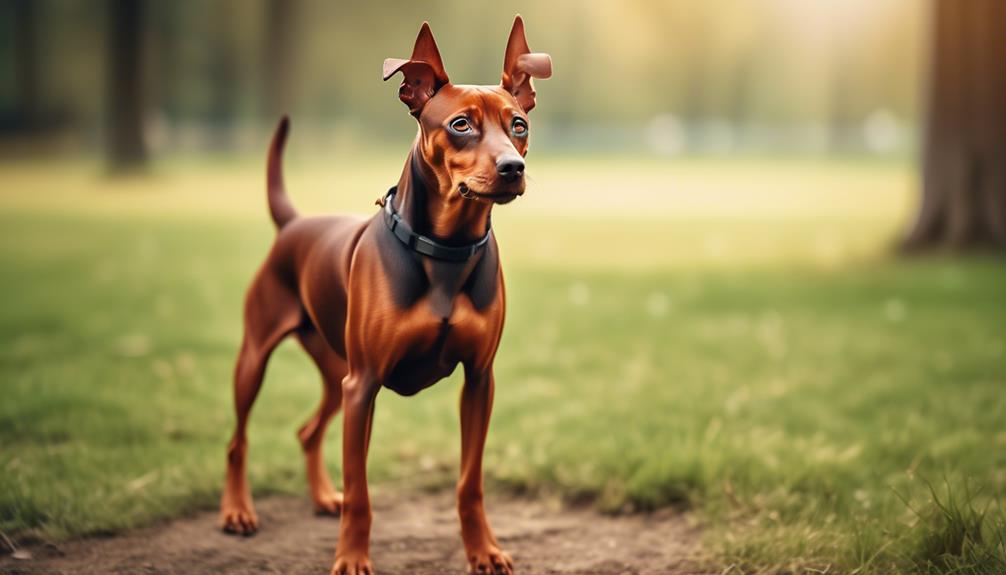
German Pinschers have a generally healthy disposition and can live for an average of 12 to 14 years. Like all breeds, they're prone to certain health conditions. Some common health issues that can affect German Pinschers include hip dysplasia, elbow dysplasia, and eye problems.
Hip dysplasia is a condition where the hip joint doesn't develop properly, leading to pain and mobility issues. Elbow dysplasia is similar, affecting the elbow joint. Eye problems can include cataracts and progressive retinal atrophy.
Regular vet check-ups, a balanced diet, and regular exercise can help maintain the overall health of German Pinschers. It's important to note that individual dogs may vary, and not all German Pinschers will develop these health issues.
Suitability for Apartment Living
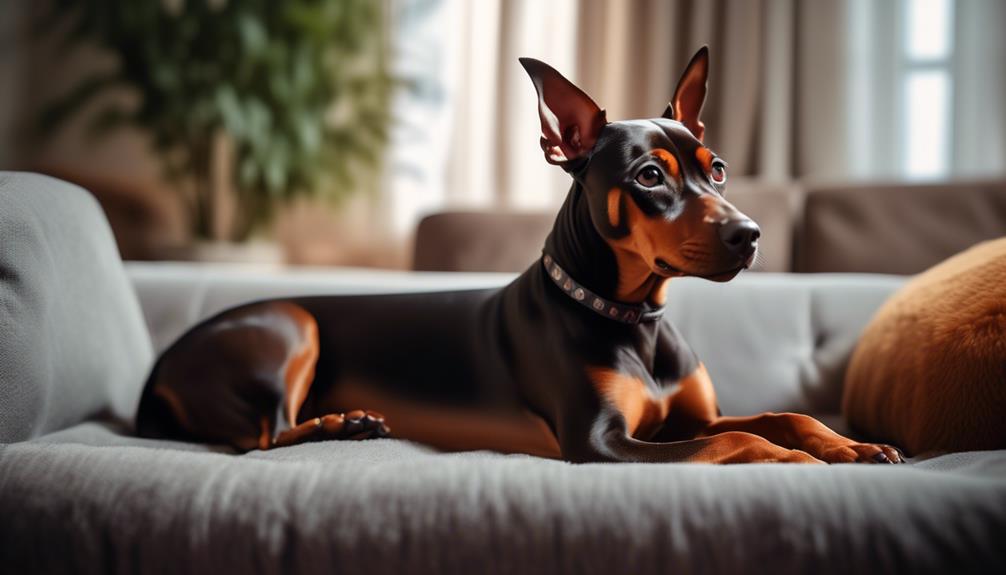
Apartment living suitability for the German Pinscher breed depends on various factors beyond their size. Considerations should include barking tendencies and behavior towards neighbors. It's important to prioritize qualities such as being quiet, low-energy, and exhibiting good manners.
Here are five factors to consider when determining if a German Pinscher is suitable for apartment living:
- Adapts Well To Apartment Living: Some dogs are more adaptable to living in small spaces.
- Good For Novice Owners: Certain breeds are easier to train and more resilient, making them suitable for first-time dog owners.
- Sensitivity Level: Some dogs are more resilient and can handle a noisy environment, while others require a calm atmosphere.
- Energy Levels: Consider the dog's energy levels and whether they align with your lifestyle.
- Behavior Towards Neighbors: Choose a pet that doesn't bark excessively and behaves politely towards others.
Tolerance for Being Alone
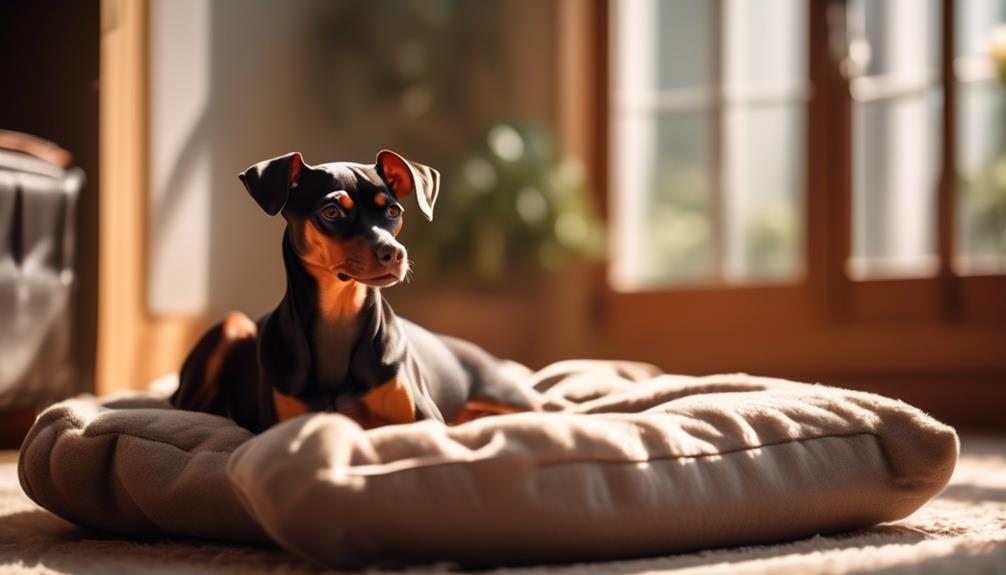
When considering a dog breed, it's important to assess their tolerance for being left alone. German Pinschers are known to be a breed that bonds closely with their family and may experience anxiety when left alone for long periods. Anxious dogs can exhibit destructive behavior, so it's crucial to ensure their well-being and prevent any potential damage in the house.
German Pinschers do best when a family member is home during the day or if they can accompany their owner to work. They thrive on human companionship and may struggle if left alone for extended periods. Therefore, prospective owners should consider their lifestyle and availability to provide the necessary attention and companionship this breed requires.
Behavioral Traits to Consider
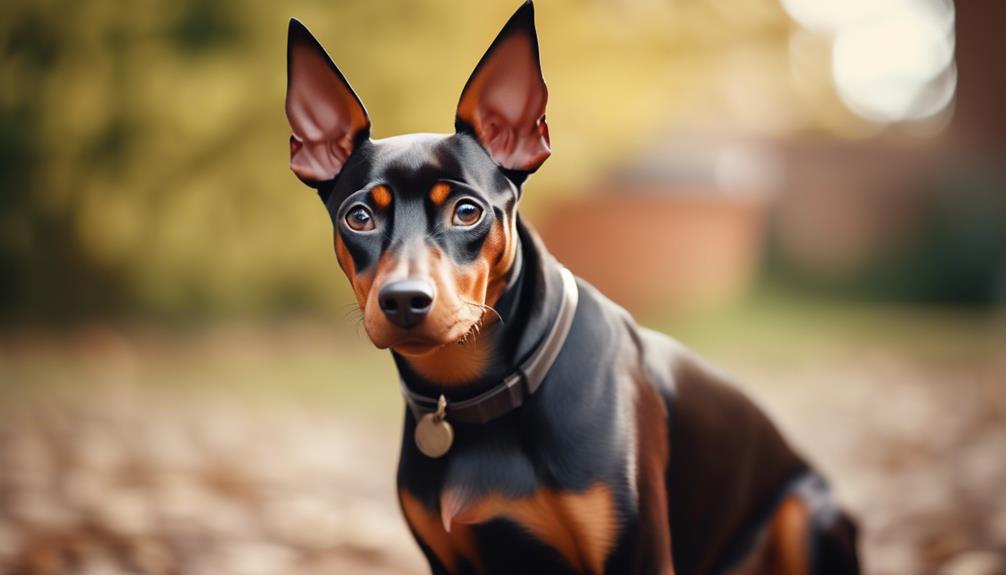
Assessing a dog breed's behavioral traits is crucial when considering the right fit for your lifestyle and living situation. When it comes to the German Pinscher, there are several behavioral traits to consider:
- Aggression and Fear: Understanding the difference between instinctual drives and aggressive behavior is important when dealing with dog aggression, which can often stem from fear and anxiety towards humans.
- Tendency to Bark or Howl: Some dog breeds have a tendency to bark or howl more frequently than others. Knowing a breed's tendency in this regard can help you make an informed decision based on your living situation.
- Wanderlust Potential: Certain breeds are more prone to wander and have a free-spirited nature. It's important to consider if you have the means to provide the necessary exercise and containment for a more independent dog.
- Exercise Needs: Dogs have different energy levels, so matching their exercise needs with your own activity level and lifestyle is crucial for their overall health and well-being.
- Potential for Playfulness: Understanding a breed's potential for playfulness can help you find a dog that matches your desired level of activity and interaction.
Additional Highlights
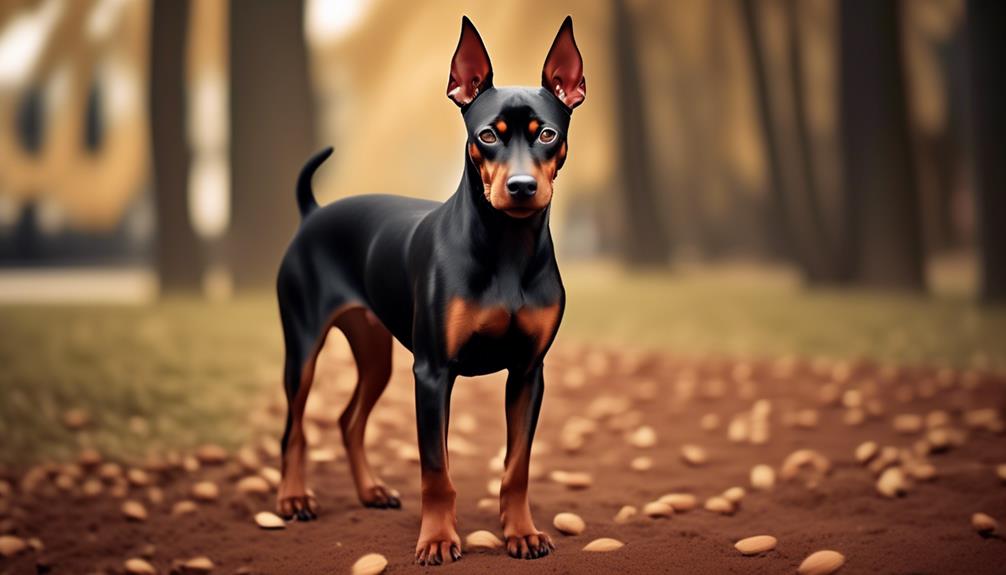
The German Pinscher stands out with its elegant appearance, combining power and beauty. This agile and athletic breed excels in various dog sports and activities, showcasing its versatility and athleticism.
German Pinschers are highly devoted and loving to their families, making them excellent companions and loyal pets. They have a low shedding coat, requiring minimal grooming, which can be a convenient factor for those looking for a low-maintenance breed.
However, it's important to note that German Pinschers are a strong-willed breed that needs a consistent and firm owner. With proper training and consistency, they can learn quickly and well.
Frequently Asked Questions
Are German Pinschers Good With Children and Other Pets?
German Pinschers can be good with children and other pets if properly socialized from an early age. They are loyal and protective, but supervision is necessary due to their high prey drive.
How Much Exercise Does a German Pinscher Need on a Daily Basis?
A German Pinscher needs a moderate to high amount of exercise on a daily basis. They are an agile and athletic breed that enjoys activities such as running, playing, and participating in dog sports.
Do German Pinschers Have a Strong Prey Drive?
Yes, German Pinschers have a strong prey drive. This means they have a natural instinct to chase and hunt small animals. It is important to provide them with proper training and socialization to manage this behavior.
Are German Pinschers Prone to Separation Anxiety?
German Pinschers can be prone to separation anxiety. They form strong bonds with their families and may exhibit destructive behavior when left alone for long periods. Proper training, socialization, and providing companionship can help alleviate this issue.
How Often Does a German Pinscher Need to Be Groomed?
A German Pinscher typically needs to be groomed about once a week. Regular brushing helps maintain their short, smooth coat and minimizes shedding. Additionally, occasional nail trims, teeth brushing, and ear cleaning are important for overall grooming maintenance.
What are the similarities and differences between German Pinschers and Doberman Pinschers?
German Pinschers and Doberman Pinschers have similar traits due to their shared ancestry. Both breeds are intelligent, alert, and loyal. However, German Pinschers are smaller and more energetic, while Doberman Pinschers are larger and more protective. For more doberman pinscher characteristics information, research their individual temperaments and needs.
Conclusion
In conclusion, the German Pinscher is a fascinating breed with a rich history and unique characteristics. One interesting statistic is that German Pinschers have an average lifespan of 12 to 14 years, making them a long-lasting and loyal companion.
Their intelligence, alertness, and protective nature make them excellent watchdogs, while their low shedding qualities and devotion to family make them a great choice for apartment living.
Overall, the German Pinscher is a wonderful breed for those seeking a devoted, agile, and long-lasting canine companion.




